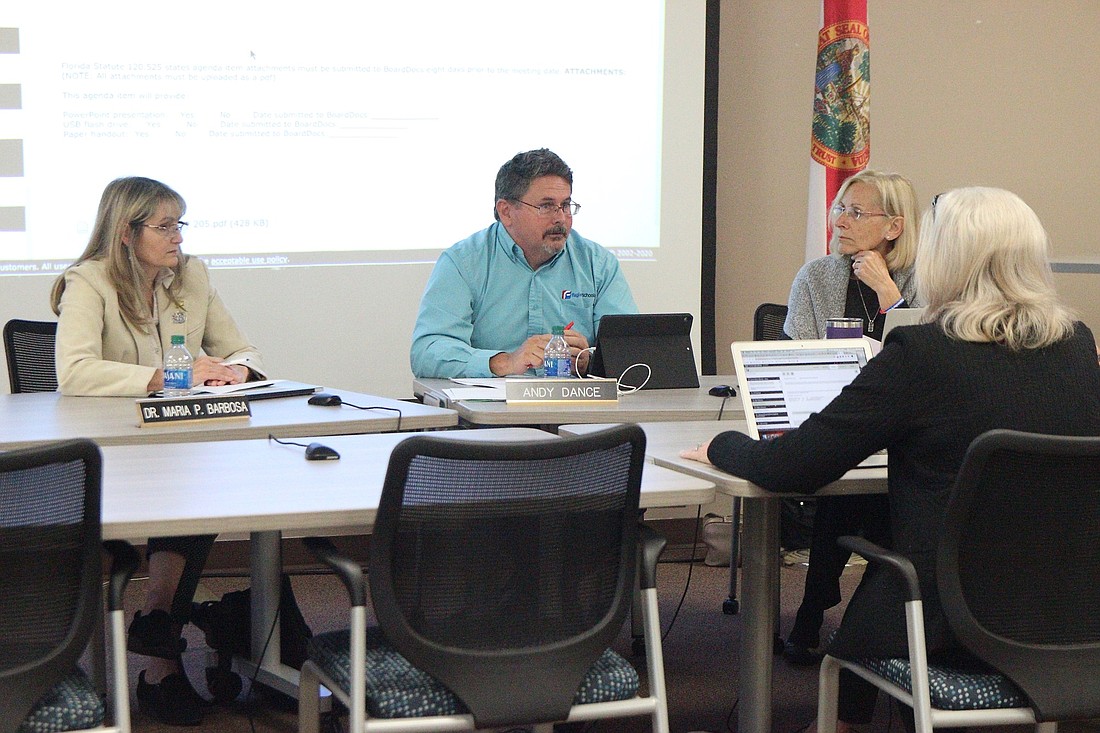- October 21, 2024
-
-
Loading

Loading

Two weeks after a School Board meeting was roiled by a dispute over transgender rights, the School Board is considering new restrictions on comments during public meetings.
During recent board meetings, a local transgender teen’s family attended and spoke during the meeting’s public comment periods to press the district to implement policies to protect transgender students’ rights in the schools.
On two occasions, a local pastor, Charlene Cothran, then took the mic during the public comment period to berate the transgender boy, calling him “confused,” referring to him as a girl. During the board’s Jan. 21 meeting, she raised her voice while speaking in the public comment period, imploring churchgoers to come to meetings and speak out against accommodations for trans people. She also held up a sign.
Audience members responded by rising in their seats and turning their backs in a show of support for the trans teen.
With the exception of board member Colleen Conlkin, who countered Cothran’s comments at length at the end of the two board meetings, School Board members did not respond directly.
Conklin has now temporarily stepped away from the board in order to apply for the district’s vacant superintendent position.
On the first workshop of her absence, board members considered new options brought by School Board attorney Kristy Gavin to restrict audience and speaker behavior.
A sign had been placed outside the board’s meeting room with a list of rules, including: "Speakers may not use any form of profanity or make loud, abusive comments," "No signs or placards shall be allowed in the Board meeting," and, "Following a warning, any person making impertinent or slanderous remarks, or who becomes boisterous while addressing the Board may be banned from further appearances before the board for the balance of the meeting. "
Gavin also presented options that would significantly change the format of the public comment period.
Currently, the district allows audience member comment on items not on the meeting agenda near the beginning of the meeting, and again near the end. Speakers at the podium sign in, then have three minutes to speak. They can also comment on any specific agenda item at the time that particular item is discussed by the board.
But the district, Gavin said, could eliminate the first public comment period, restricting citizen comments on items not on the agenda to the end of the meeting.
It could also require anyone who wants to speak during a public meeting to first fill out a comment card. They would then be called up individually by a district staff member.
That would streamline the public comment process, she said. She added that the current process, with residents signing their names at the podium right before they speak, tends to make speakers feel rushed and write illegible signatures.
“This way, each person knows they would be coming,” Gavin said. “They would also be notifying us of the subject matter that they intend to speak about.”
Gavin said she’d been speaking with a staff member of another district who’d said that that district doesn’t allow comments that address any specific person or situation, and restricts speakers to generalities.
“Then, again, the student isn’t being foisted into the limelight,” Gavin said.
“That’s excellent; I like it,” Board Chairwoman Janet McDonald said.
Gavin spoke of the kind of comment that would not be allowed — any in which a parent speaks specifically about an issue with their own child — and gave an example of one which would: a comment such as a recent one by a community member who urged the district to ensure it has adequate equipment to prevent heat stroke at district athletic events.
Such a policy would have barred Randy Bertrand, the parent of the local transgender teen, from addressing the board specifically about what his child was experiencing. It also would have barred Cothran from speaking abusively about the teen.
No other local government body in Flagler County has such stringent rules about what the public can or can’t speak about during the public comment period, and none require comment cards.
“I’m not in favor of the cards,” board member Andy Dance said. “I feel like it’s a limitation on our public’s free speech."
The issue with illegible signatures on the public comment sign in sheet, he said, could be addressed simply by placing the sheet on a table with a staff member rather than at the podium itself. Dance said he thought the full board should be present to discuss any such policy changes before they're enacted.
And, he reiterated, "I don’t like the cards at all."
Board member Maria Barbosa was in favor of the cards; Trevor Tucker was absent. McDonald suggested a trial period for the proposed new policy.